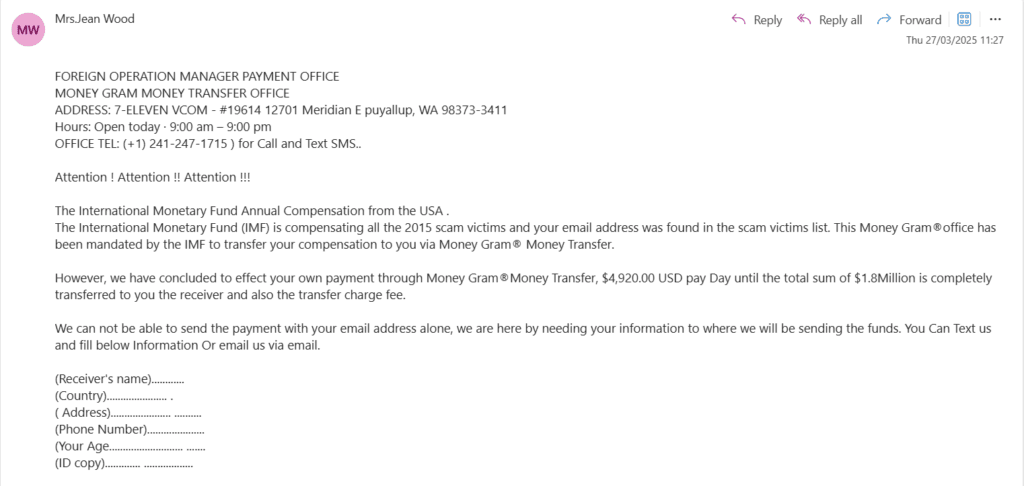Scammers continue to find new ways to deceive victims, and one of the latest tactics involves a fraudulent email claiming to be from the International Monetary Fund (IMF) and MoneyGram. The email states that you are entitled to a massive compensation payout due to being a past scam victim, but you must provide personal information before receiving the money.
This scam is designed to steal your personal details and possibly demand upfront fees later. Below, we break down the full email, the red flags, and how to protect yourself.
The Scam Email Details
📩 From: Mrs. Jean Wood
📅 Sent: Wednesday, March 26, 2025, 19:27
📩 Reply-To: “[email protected]” [email protected]
📜 Subject: Foreign Operation Manager Payment Office
Original Scam Email
FOREIGN OPERATION MANAGER PAYMENT OFFICE
MONEY GRAM MONEY TRANSFER OFFICE
ADDRESS: 7-ELEVEN VCOM - #19614 12701 Meridian E Puyallup, WA 98373-3411
Hours: Open today · 9:00 am – 9:00 pm
OFFICE TEL: (+1) 241-247-1715 ) for Call and Text SMS..
Attention ! Attention !! Attention !!!
The International Monetary Fund Annual Compensation from the USA.
The International Monetary Fund (IMF) is compensating all the 2015 scam victims and your email address was found in the scam victims list. This Money Gram® office has been mandated by the IMF to transfer your compensation to you via Money Gram® Money Transfer.
However, we have concluded to effect your own payment through Money Gram® Money Transfer, $4,920.00 USD per day until the total sum of $1.8 Million is completely transferred to you the receiver.
We cannot send the payment with your email address alone, we are hereby needing your information to where we will be sending the funds. You Can Text us and fill in the below Information Or email us via email.
(Receiver's name)............
(Country)...................... .
(Address)...................... ..........
(Phone Number).....................
(Your Age........................... .......
(ID copy)............. ..................
Note that your payment files will be returned to the IMF within 72 hours if we do not hear from you because this was the instruction given to us by the IMF office here in Washington DC USA. We will start the transfer as soon as we receive your information.
You are hereby warned not to communicate or duplicate this message for any reason whatsoever because the US FBI is already tracking the criminals from Africa.
THANKS,
Mrs. Jean Austin
Foreign Operation Manager Payment Office

Breaking Down the Scam
This email contains multiple red flags that indicate it is a scam:
- Fake Authority Figures: The scammer claims to be from the IMF and MoneyGram, but neither of these organizations randomly contacts individuals with compensation offers.
- Unrealistic Payment Promises: The email claims you will receive $4,920 per day via MoneyGram until a total of $1.8 million is paid. No legitimate financial institution operates this way.
- Requests for Personal Information: The scam asks for sensitive details, including your ID copy, phone number, and address—information that could be used for identity theft.
- Urgency and Threats: The email says your files will be returned to the IMF within 72 hours if you don’t reply, pressuring you to act fast.
- Poor Grammar & Formatting: Many scam emails contain poor spelling, grammar, and formatting mistakes, as seen in this email.
How This Scam Works
Scammers use this type of email to gather personal information and later demand “transfer fees” or “processing costs” before sending the supposed payment. Once a victim pays, the scammer either disappears or continues to invent additional fees to extort more money.
How to Protect Yourself
- Do Not Respond – Ignore emails that claim you have won or are entitled to large sums of money, especially if they ask for personal details.
- Verify the Sender – Check the sender’s email address and look for signs of fraud. Government agencies and banks do not use free email accounts like Gmail or Yahoo.
- Never Share Personal Information – Legitimate financial institutions do not ask for personal details via email.
- Check for Red Flags – Look for poor grammar, unrealistic promises, and urgent demands—common scam tactics.
- Report the Scam – Forward scam emails to [email protected] or your country’s cybercrime agency.
Conclusion
The IMF Compensation Scam is yet another example of fraudsters impersonating government institutions to trick victims. If you receive an email like this, do not engage—instead, report it and warn others.
Stay vigilant, stay safe – with FraudExpose.com.
